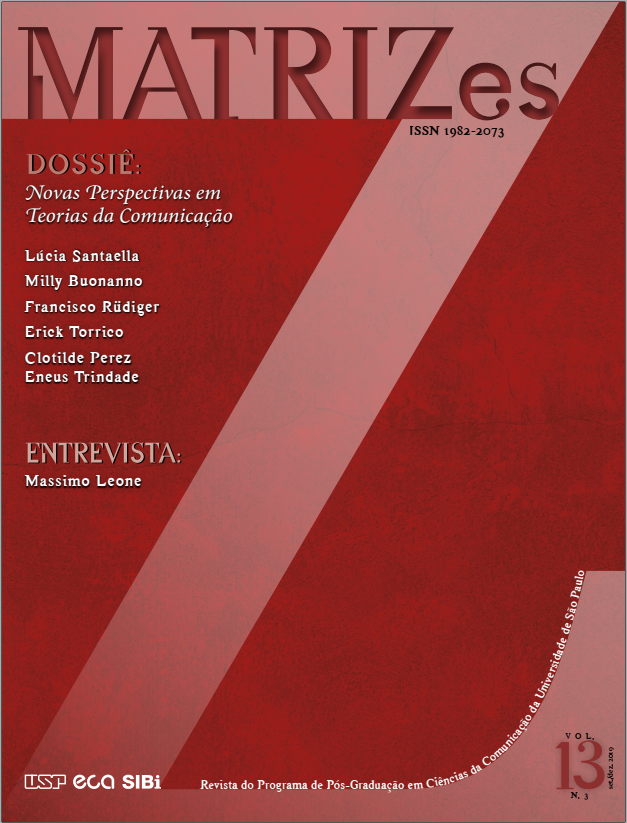The book as a cognitive prosthesis
DOI:
https://doi.org/10.11606/issn.1982-8160.v13i3p21-35Keywords:
Contemplative, Moving, Immersive, Ubiquitous readerAbstract
Beyond reader of books, the twentieth century saw the birth of a new kind of image reader in photos, advertisements, and movies: the moving reader. Then with the emergence of the internet, came the immersive reader, who navigates and interacts on the webs’ information highways. Next, the advent of mobile media brought along with the ubiquitous reader, who has access to information wherever it may be. Given this sequential and plural framework, this article asserts the need to maintain, in educational environments, the cognitive skills of the book reader, here referred to as the contemplative reader, since the book, among all media, is the one that works as a prosthesis for the development of reflexivity.
Downloads
References
Beres, D. (2017a, 11 de setembro). How reading make you more intelligence and empathy. Big Think. Recuperado de http://bit.ly/2MGGjN7
Beres, D. (2017b). Whole motion: Training your brain and body for optimal health. Nova York, NY: Carrol.
Borges, J. L. (1971). Prólogo a la primera edición. In J. L. Borges, Historia universal de la infamia (pp. 7-8). Buenos Aires, Argentina: Alianza Emece.
Carr, N. (2008, julho/agosto). Is Google making us stupid? What the internet is doing to our brains. The Atlantic. Recuperado de http://bit.ly/2Jh2o2V
Carr, N. (2011). A geração superficial: o que a internet está fazendo com os nossos cérebros (M. G. F. Friaça, Trad.). Rio de Janeiro, RJ: Agir.
Chafee, J. (2014). Critical thinking, thoughtful writing. Stanford: Cengage Learning.
Chartier, R. (2007, 1º de agosto). Os livros resistirão às tecnologias digitais (Entrevista concedida a Cristina Zahar). Nova Escola. Recuperado de http://bit.ly/2BHiSNm
Cintra, A. M. M. (2008). A leitura na educação continuada: Uma reflexão. In A. M. M. Cintra (Org.), Ensino de língua portuguesa: Reflexão e ação (pp. 35-50). São Paulo, SP: Educ.
Krane, B. (2006). Researchers find kids need better online academic skills. Advance, 25(12). Recuperado de http://bit.ly/2qybCkG
Lajolo, M. (1997). Do mundo da leitura à leitura do mundo. São Paulo, SP: Ática.
Leu, D. J.; Forzani, E.; Rhoads, C.; Maykel, C.; Kennedy C.; Timbrell, N. (2014). The new literacies of online research and comprehension: Rethinking the reading achievement gap. Reading Research Quarterly. Recuperado de http://bit.ly/2CCMgFj
López-Ruiz, O. J. (2018). Weber, Foucault e as ciências sociais hoje: é possível pensar os processos de socialização e subjetivação no século XXI? In F. A. A. Jardim, A. L. Teixeira, O. J. López-Ruiz, & M. H. O. Augusto (Orgs.), Marx Weber e Michel Foucault: Paralelas e intersecções (pp. 301-326). São Paulo, SP: EDUC/Fapesp.
Marcuschi, L. A. (2000). Leitura e compreensão de texto falado e escrito como ato individual de uma prática social. In R. Zilberman, & E. T. Silva (Orgs.), Leitura: Perspectivas interdisciplinares (pp. 38-57). São Paulo, SP: Ática.
Santaella, L. (1980). Relendo o problema da leitura. Cadernos PUC, (8), 3-10.
Santaella, L. (2004). Navegar no ciberespaço: O perfil cognitivo do leitor imersivo. São Paulo, SP: Paulus.
Santaella, L. (2010). A ecologia pluralista da comunicação: Conectividade, mobilidade, ubiquidade. São Paulo, SP: Paulus.
Santaella, L. (2013). Comunicação ubíqua: Repercussões na cultura e na educação. São Paulo, SP: Paulus.
Santaella, L. (2014). Redação e leitura: Guia para o ensino. São Paulo, SP: Cengage Learning.
Santaella, L. (2016). Prefácio. In P. Ferrari (Org.), Comunicação digital na era da participação (pp. 11-15). Porto Alegre, RS: Editora Fi.
Tiburi, M. (2016, 31 de janeiro). Potência do pensamento: Por uma filosofia política da leitura. Cult. Recuperado de http://bit.ly/31MmUit
Wolf, M. (2008). Proust and the squid: The story and science of the reading brain. Nova York, NY: Harper.
Wolf, M. (2019). O cérebro no mundo digital: Os desafios da leitura na nossa era (R. Ilari & M. Ilari, Trads.). São Paulo, SP: Contexto.
Downloads
Published
Issue
Section
License
Authors who publish in this journal agree to the following terms:
- Authors retain the copyright and grant the journal the right to first publication, with the work simultaneously licensed under the Creative Commons Attribution License (CC BY-NC-SA 4.0) which allows sharing of the work with acknowledgment of authorship and initial publication in this journal for non-commercial purposes.
- Authors are authorized to assume additional contracts separately, for non-exclusive distribution of the version of the work published in this journal (eg, publishing in institutional repository or as a book chapter), with acknowledgment of authorship and initial publication in this journal.






















